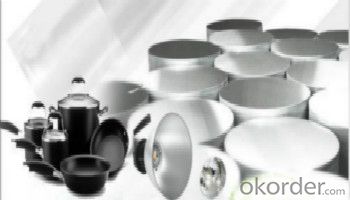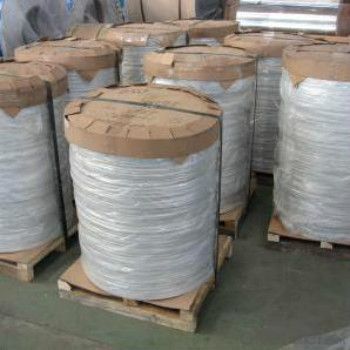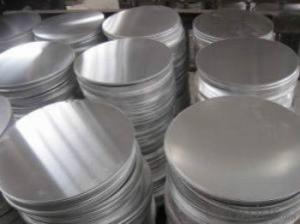Deep Drawing Aluminium Circle for Utensils
- Loading Port:
- Shanghai
- Payment Terms:
- TT OR LC
- Min Order Qty:
- 5 m.t.
- Supply Capability:
- 2000 m.t./month
OKorder Service Pledge
OKorder Financial Service
You Might Also Like
Item specifice
1. Structure of DC Aluminium in Coil Form for making Aluminium Circle Description
DC Aluminium in Coil Form for making Aluminium Circle is one semi-finished aluminium material. This coil can be rolled down to aluminium coil,sheet,circle ect. The alloy AA1050 is widly used in building, industry ect. Its weight is much lower than steel. So many customers choosed aluminium material instead of steel.
2. Feature of DC Aluminium in Coil Form for making Aluminium Circle
Surfact Quality :
Be free from Oil Stain, Dent, Inclusion, Scratches, Stain, Oxide Dicoloration, Breaks, Corrosion, Roll Marks, Dirt Streaks and other defect which will interfere with use,
Mechenical Property:
Chemical Composite and Mechanical Property
3. Image of DC Aluminium in Coil Form for making Aluminium Circle


4. Specification of DC Aluminium in Coil Form for making Aluminium Circle
Aluminum Coil/Sheet | |
Main Specification | |
Alloy | AA1xxx (AA1050, AA1060, AA1070, AA1100 etc.) |
AA3xxx (AA3003, AA3004, AA3005, AA3105 etc.) | |
AA5xxx, AA6XXX (AA5052,AA5083, AA5754, AA6061, AA6062 etc.) | |
AA8xxx(AA8011, AA8006 etc.) | |
Temper | H14,H16, H18, H22, H24, H26, H32,O/F, T4, T6, T651 |
Thickmess | 0.01mm-100mm |
Width | 30mm-1700mm |
Standard | GB/T 3880-2006/ASTM |
Special specification is available on customer's requirement | |
5. FAQ
1) What is the delivery time?
Depends on actual order, around 20 to 35 days
2) What is the QC system:
We have QC staff of 20 persons and advanced equipment, each production is with MTC traced from Aluminum ingot lot.
3) What market do you mainly sell to?
Australia, America, Asia, Middle East, Western Europe, Africa etc
4)What about payment term?
30% T/T in advance, balance against B/L COPY or 100% L/C AT SIGHT.
- Q:Why does aluminum foil burn in the microwave but not in the oven?
- Aluminum foil doesn't actually burn in the microwave. What you are seeing is called the electro-magnetic effect. Microwaves travel as particles called photons, and when those photons hit your aluminum, they collide with the aluminum atoms and create extra electrons. Now, in larger pieces of metal, like a fork or a thermos, these electrons are distributed throughout the bulk of the object, but on thin pieces of conductive metals, like aluminum foil or gold plating, these electrons quickly build up a significant electric charge. What happens next is the same thing that happens when you drag your sock feet across the carpet in the winter and shock someone with the static charge. Sparks begin jumping from one part of the foil to another, or from the foil to the microwave itself. These sparks can cause a fire and ruin your microwave oven, to say nothing of your poor baked potato. Conventional ovens do not use microwaves, but rather just heat up the foil. Aluminum won't catch fire no matter how hot you get it, although it will eventually melt. But it is unlikely that your conventional oven will ever become that hot.
- Q:Are aluminum coils suitable for solar reflectors?
- Yes, aluminum coils are suitable for solar reflectors. Aluminum is a widely used material for solar reflectors due to its high reflectivity and durability. It has a reflective surface that can efficiently redirect the sunlight onto the desired target, such as a solar panel or collector. Additionally, aluminum coils are lightweight and easy to shape, making them ideal for creating curved or angled reflector surfaces. The reflective coating on aluminum coils can withstand harsh weather conditions and provide long-lasting performance. Overall, aluminum coils are an excellent choice for solar reflectors due to their reflectivity, durability, and versatility.
- Q:Will the surface of aluminum contact water if the aluminum coil falls into water?
- You mean whether water will penetrate into the gap? If you get it out quickly, basically it will be ok. If there is something wrong, you can put it under the sun to see whether there is water oozing from the gap.
- Q:Can aluminum coils be anodized?
- Yes, aluminum coils can be anodized. Anodizing is a process of enhancing the natural oxide layer on the surface of aluminum to create a more durable and corrosion-resistant coating.
- Q:What are the thermal conductivity properties of aluminum coils?
- Aluminum coils have high thermal conductivity properties, which means they are efficient in transferring heat.
- Q:Can aluminum coils be customized?
- Yes, aluminum coils can be customized. They can be manufactured in various sizes, thicknesses, and shapes to meet specific requirements and applications. Additionally, they can undergo surface treatments, such as coatings or finishes, to enhance corrosion resistance or aesthetic appearance.
- Q:I know this question is not so bright, but I am very curious why do we recycle aluminum cans? Is it that they are not biodegradable?
- Heck yeah. Even an old school, smoke-belching industrialist would recycle *metal*. That's always been true. Why did people suddenly stop recycling metals? Have you PRICED metals lately? Aluminum is over a buck a pound, copper is $3 a pound, steel is over $200 a ton.
- Q:Can aluminum coils be used for electrical transformers?
- Yes, aluminum coils can be used for electrical transformers. Aluminum is a suitable material for transformer coils due to its high electrical conductivity and lower cost compared to copper. While copper has traditionally been the preferred choice for transformer windings, the use of aluminum has gained popularity in recent years due to its lighter weight and lower price. Aluminum coils are also advantageous in terms of thermal conductivity, as they dissipate heat more efficiently than copper. However, it is important to consider the specific requirements and design considerations of the transformer, as the choice between aluminum and copper coils may depend on factors such as voltage, current, size, and insulation requirements.
- Q:I need to make aluminum powder. What machine should I use and what aluminum object should I use?
- The okorder
- Q:What is the maximum width and thickness of aluminum coils?
- The maximum width and thickness of aluminum coils can vary depending on the specific requirements and capabilities of the manufacturer. However, generally speaking, aluminum coils can have a maximum width ranging from 36 inches to 72 inches or even wider. As for the thickness, it typically ranges from 0.006 inches to 0.25 inches. It is important to note that these dimensions may vary in different industries and applications, so it is always best to consult with the manufacturer or supplier to determine the specific maximum width and thickness that meets your needs.
1. Manufacturer Overview |
|
|---|---|
| Location | |
| Year Established | |
| Annual Output Value | |
| Main Markets | |
| Company Certifications | |
2. Manufacturer Certificates |
|
|---|---|
| a) Certification Name | |
| Range | |
| Reference | |
| Validity Period | |
3. Manufacturer Capability |
|
|---|---|
| a)Trade Capacity | |
| Nearest Port | |
| Export Percentage | |
| No.of Employees in Trade Department | |
| Language Spoken: | |
| b)Factory Information | |
| Factory Size: | |
| No. of Production Lines | |
| Contract Manufacturing | |
| Product Price Range | |
Send your message to us
Deep Drawing Aluminium Circle for Utensils
- Loading Port:
- Shanghai
- Payment Terms:
- TT OR LC
- Min Order Qty:
- 5 m.t.
- Supply Capability:
- 2000 m.t./month
OKorder Service Pledge
OKorder Financial Service
Similar products
New products
Hot products
Hot Searches
Related keywords




























